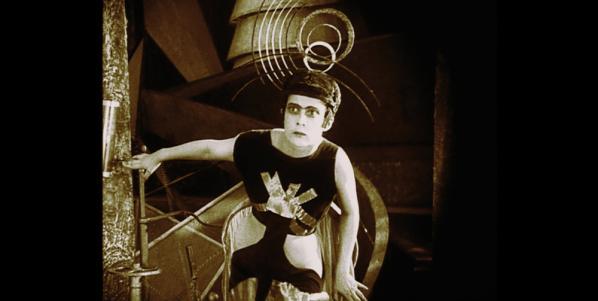



Feature image: Still from Dreams Rewired: original source Das Auge der Welt (Germany 1935); dir: C. Hartmann
Dreams Rewired / Mobilisierung der Träume – Trailer from Amour Fou on Vimeo.
The 2015 film Dreams Rewired, recently shown at the Watermans Digital Weekender in London on 12-13 November, will be screened again at Watermans on 3 December. Directed by Manu Luksch, Martin Reinhardt and Thomas Tode, the film has the tagline ‘Every age thinks it’s the modern age’. It looks back to the early 20th Century, to the development and implementation (first locally, then globally) of the telephone, the radio and television.
The makers of Dreams Rewired unearthed and arranged early film recordings and brought them into the 21st century context. This was done via a playful narrative written by Manu Luksch and Mukul Patel and read by Tilda Swinton. The tagline was well chosen; almost everything Swinton says would have been relevant at almost any point within the last century. Time periods, machineries and political movements are connected in clever and unexpected ways, meaning that Dreams Rewired, a durational video whose narrative follows a recognisable storytelling structure, makes numerous links between times, places and people, which branch off from the safety of its linear structure.
Dreams Rewired is something of a treasure trove, not only for the glimpses its found-footage building-blocks gives into a past era but also because of the inter-generational, inter-national, inter-thematic connections it makes. Frequently while watching the film I felt the urge to burrow into an investigation of one of the clips, stories or introduced contexts. To emulate this ‘tip of the iceberg’ effect, this review will pull words directly from the film, linking quotations to some of the themes which appear and reappear throughout.
“A new electric intimacy”
With new media come new practices of communication. One of the recurring themes described in Dreams Rewired is the coupling of intimacy and invasion of privacy introduced to society along with a new communication method. Just as a new invention is prototyped, its social implementation causes new prototypical behaviours – new ways of caring, new ways of injuring, new comings-together, new separations. Uncertainty is inherent to experimentation.
“The waves travel at the speed of light, defining what simultaneous means. Information can travel no faster.”
When something is newly possible it also newly achievable – new precedents are set and new avenues opened for exploration. There is a flurry of activity, a rapid diversification. For those looking to gain or retain power over others, this is a problem; diversity requires more effort to manage. Initial flurries of activity are curtailed by the introduction of rules, the setting of precedents.
This limitation sets new targets to meet, new challenges to overcome. The cycle starts again as those in power look for ways to consolidate it while those without look to gain what they can. This is a simplistic, but not inaccurate, description of the machinery of the capitalist world.
This cycle of diversification and restriction is always coupled with the establishment and transcendence of thresholds. Experimentation with a new technology reveals some of its limits. (Side note – of course, what is understood as a limit is defined by wider cultural contexts.) “Information can travel no faster” is a provocation to speed up.
“Geography is history”
New advances cause conceptual shifts. Early telephony and television shrunk the gap in time between a thought or plan and its activation. Understandings of time and geography changed, and it became possible to move into new spaces and in new ways at socially impressive speeds. New powers, in short, were available to those who knew how to access them, to those who understood the preceding context well.

“A model of the new human is put into circulation”
A network grows, its complexity and partner processes intensifying. The machinery of daily life is altered, and daily life is a testing ground. Social interactions change as the new set of behaviours required to work the new machinery collide with existing social norms and rituals. New jobs and new workplace structures appear and people previously without responsibility or power find themselves in contact with it (though they may not understand the possibilities at first). People are no longer the same beings as before. Cycles of experimentation and consolidation reach into the body.
“Someone will have to lift us up. But who will lift them up?”
The flurry of excitement surrounding a new invention is based on the idea that ‘our’ lives will be improved, that ‘we’ will be able to do, see, have more. There is a problem here. The words ‘we’ and ‘us’ are too abstract – they bracket whoever the speaker wants them to bracket and recapitulate the prejudices they have. Anyone who is not included as part of the ‘we’ simply does not exist. This is convenient for the ‘us’ – while ‘we’ rush excitedly towards a future in which we have more and better, what ‘they’ do is of little concern. The ‘us’ does not care – or even think much – about the ‘them’. The ‘us’ cannot understand why the ‘them’ has not joined the ‘us’. After all, the ‘us’ is at a new threshold – who would not want to reach the other side?
“Personal profiles, passwords, biometrics..fully documented. Every trace filed. Bigger data, better analytics. Opt out, and we lose our place in the world. So…we share the keys to our desire, our habits, to ourselves.”
To be part of the ‘us’ and the ‘we’ requires effort. To ‘opt in’ requires sacrifice. At the same time, ‘opting in’ is the easiest thing in the world when ‘opting out’ means facing a void. Advice on how to do well, how to achieve, how to be healthy is easy to come by, but there is little guidance for those who find themselves, or wish themselves, outside the mainframe. Losing one’s place in the world means losing access to that mainframe and the stability that comes with a highly legible structure. Today the legible structure is far-reaching and well established, to the extent that opting out is dealt with violently. The new models of human coming into circulation have trouble recognising the old. There is a mutual rejection.

“Government regulation stifles amateur culture – military and commercial interests occupy most of the spectrum … transmission becomes a privilege, not a right”
As I wrote earlier, the ‘us’ and ‘them’ structure is too simple. It would be more accurate to think of people as communicating on multiple frequencies. The machinery of society is complicated to say the least, and made more so by the mainframe, which amplifies transmissions at some frequencies while restricting others. In the early 20th Century, multiple obscure radio channels were repressed, responsibility placed with public backlash following rumours that amateur radio was responsible for the sinking of the Titanic. Side questions: where did the rumours come from? What were they based on? How was the public response measured?
“For the first time he hears himself as others do. A voice absolutely familiar but estranged…But her power also grows: by controlling his voice she controls her time”
There is a strange relationship between the controller and the controlled. For every CEO there is a team whose own agenda seeps into the workings of the company. Dislocated power and fragmented or unplaceable identity are some of the symptoms of a complex system undergoing change. When a system is so complex as to involve multiple timescales, spaces, materials and structures, it is impossible to predict the future.
—
Dreams Rewired is part of the Technology is Not Neutral Symposium
3 December 2016
Watermans, London
https://www.watermans.org.uk/events/technology-is-not-neutral-symposium/